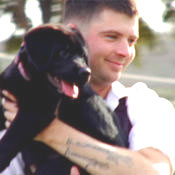
As the men and women who serve in our armed forces return from duty in Afghanistan and Iraq, many still feel the effects of the war both physically and emotionally. Many suffer wounds and scars but a large number of our military personnel return from battle with Post Traumatic Stress Disorder which makes it difficult to cope with daily activities.
Freedom Dogs was founded in 2004 to help in "speeding the recovery and enhancing the lives of wounded military heroes through the use of specialty-trained service dogs." The program helps soldiers coming home the war to overcome persisting medical and physical limitations.
Sgt. Ian Welch is one of the first Marines to work with a Freedom Dog. Sgt. Welch had tours of duty in Iraq in 2003, 2004 and 2005. A traumatic brain injury and severe PTSD has left him withdrawn and depressed. "I lost 12 Marines in three years; some lose 12 Marines in one day. I count myself lucky," he says.
Now living in San Diego, Sgt. Welch brought the traumas of war home with him and says that he lives with PTSD every day. He forgets little things and becomes confused as to why he is unable to remember. As he sank deeper into his depressed state, his commanding officer, Capt. Catherine Harrington, thought that he was “withdrawn and dealing with some of the awful things these guys have to deal with.” Then he spent six months with Freedom Dogs and she has seen a drastic difference in his emotional state.
Sgt. Welch is training Gunner, a black Labrador Retriever puppy, to be his full-time service dog. He must train with Gunner for one year and once he meets all of the requirements, Gunner will be his service dog. Sgt. Welch also works with three other Freedom Dogs on a rotating basis and Beth Russell, the founder of Freedom Dogs, is amazed at how much her dogs have helped Sgt. Welch in such a short time. “Sgt. Welch is so much more confident,” says Russell. “He smiles and he laughs. He didn’t smile when I first met him.”
The dogs train for two years and are able to help counter the effects of PTSD by offering a simple, cuddly distraction. Anything from a loud noise to seeing a box on the side of the road can trigger PTSD. When Sgt. Welch is feeling anxious, the dogs make their presence known through touch. "I’m not ducking under the table yelling, ‘grenade,’ but I might be thinking about it and it’s that simple act of the dog putting his head on my boot that grounds me."